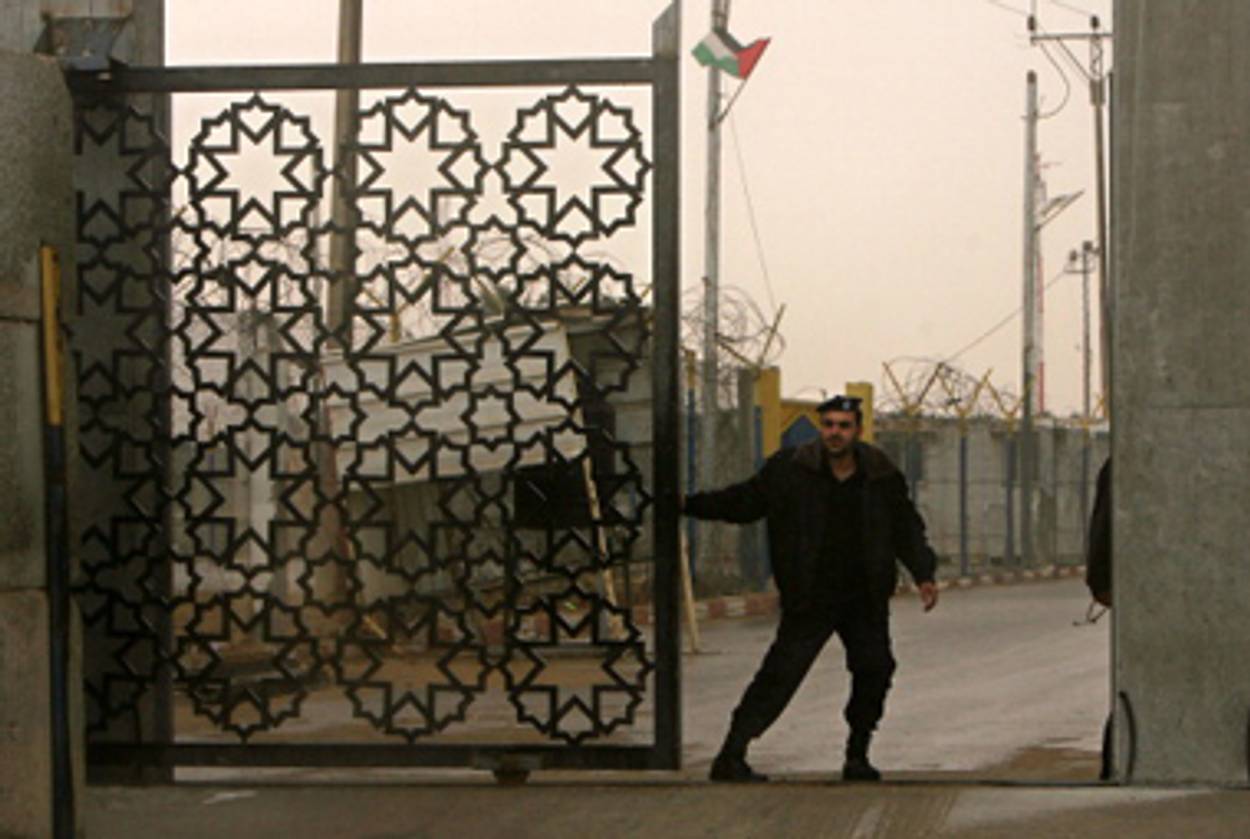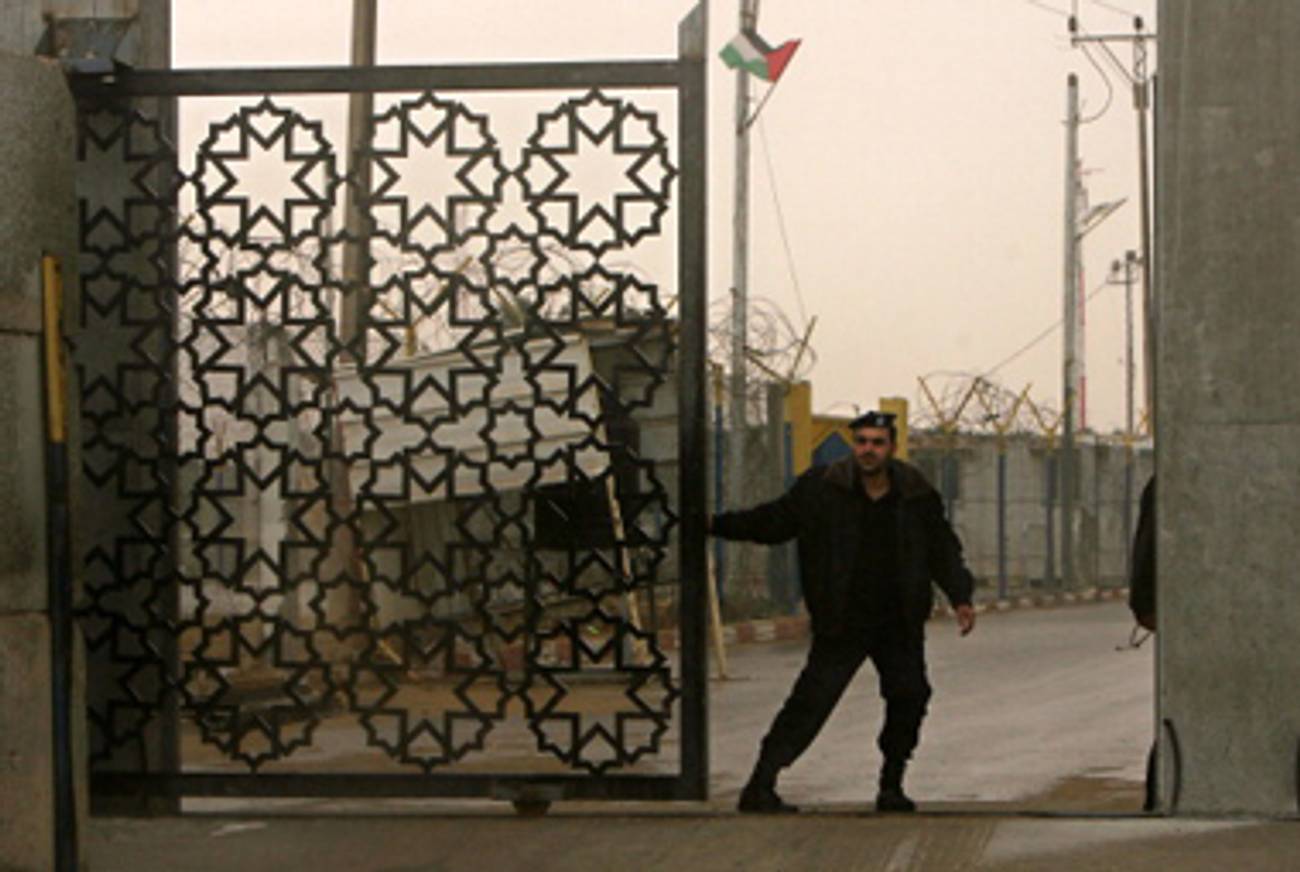Borderline
There are several good reasons why Israelis are pulling for the Mubarak regime to hold onto power in Egypt. But maybe they should be embracing change there, instead.




Never have so many Jews lost so much sleep over the fate of one ailing Arab dictator.
This would be the opening line to a Jackie Mason monologue if it wasn’t a pretty valid description of the way most Israelis spent their weekend. Judging by the extensive (if not borderline compulsive) manner in which the Israeli media has been covering the recent events in Egypt, one would be correct to assume that in a very strange, if not ironic, twist, Israel has come to see its own fate as tied to that of the waning regime of President Hosni Mubarak. Although Benjamin Netanyahu instructed his ministers to keep silent about the events in Egypt, a top government official present at the high-level security meeting called by the Israeli prime minister on Saturday night expressed what ordinary Israelis and policymakers alike seem to have been feeling this weekend: “We all want to believe that the steps taken by Mubarak will put a stop to the demonstrations.”
There are many reasons why Israelis are losing sleep over the fate of the ailing Egyptian autocrat and keeping their fingers crossed that the demonstrations simmer down. And although they are diverse, complex, and even contradictory, they all suggest that whether or not Mubarak actually makes it through this unprecedented challenge to his 30-year rule, Israelis are anxious about waking up in a new Middle East without him. Here are the four main reasons:
1. The Return of the Southern Front
With the signing of the Camp David peace accords with Egypt in 1979, Israel had a major weight—militarily and economically—lifted from its back. Having secured its vast southern border through diplomacy, it was able to commit the bulk of its military to securing its increasingly volatile northern borders with Lebanon and Syria, and, perhaps just as significantly, in the process it was also able to reallocate valuable resources and manpower from the military toward economic and social ends. More than anything else, the peace with Egypt—which had been Israel’s most formidable military foe in all its wars until that point—enabled Israeli strategic planners to focus on the ever-growing Iran-Syria-Hezbollah axis while constructing an elaborate defense strategy that relied upon one fundamental premise: that Israel’s southern border would remain quiet in the event of a regional war.
But this premise—long the backbone of Israel’s post-1979 strategic thinking—is now jeopardized. Without the assurances of an Egyptian regime dedicated to maintaining the Camp David accords, Israel will have to reorient its defense strategy while also finding a way to neutralize the extremely powerful Egyptian military—one that, courtesy of $1.5 billion from the United States each year, has acquired U.S.-made M1 Abrams battle tanks, Apache helicopters, and F-16 fighter jets. Not only would a hostile Egyptian regime potentially threaten Israel’s southern flank in time of war, but it could also cut off Israel’s access to the Suez Canal—a pivotal sea lane for Israeli submarines, which, in the event of war with Iran, would have to make their way to the Persian Gulf. Finally, one cannot forget that Israel’s most dedicated partner in isolating Hamas and maintaining the blockade on Gaza is the Egyptian Army. Any deterioration in this cooperation, which has successfully limited arms smuggling into Gaza, could further empower Hamas.
Taking all this into account, it’s not surprising that the reopening up of a southern front may be the closest thing to an existential threat that Israeli policymakers can foresee, with the exception of an Iranian nuclear weapon.
2. The Islamist Challenge
The peril of radical Islam has always been the Gordian knot that has tied Israeli and Egyptian security interests together. Under the premise that my enemy’s enemy is my friend, Israeli and Egyptian intelligence services have long cooperated in combating Islamic terrorism and curtailing Hamas—which, because of its close ties to Egypt’s Muslim Brotherhood, is feared by Egyptians as much as by the Israelis. The possible collapse of a secular pro-Western regime in Egypt has always been so disquieting to Israelis precisely because of the chance that it could unleash latent radical Islamic forces and, in the process, create a fundamentalist Sunni regime in Cairo that would align with Hamas, Hezbollah, and Iran. Look at a map: This would, quite literally, encircle Israel in a ring of Jihad.
Based on a startling 2008 Gallup poll that found a whopping 64 percent of Egyptians in favor of making Sharia law into the exclusive source of their legal code, one can certainly understand concerns about the potential radicalization of the most populous Arab country.
Although the Muslim Brotherhood has so far maintained a conspicuously low profile in the ongoing demonstrations, taking a back seat to the secular democratic forces, the well-organized, well-financed, and politically savvy organization founded by Hassan al-Banna over 80 years ago may simply be biding its time and waiting for the opportunity to take advantage of a post-Mubarak power vacuum in order to make its move in a Bolshevik-style power grab.
3. The Arab Street
The rise of the Arab street and particularly its mercurial and unpredictable populist elements—which may very well be animated by a genuine democratic impulse—remains a paramount source of anxiety for Israelis. The experience of the past five years certainly proves why: With the exception of in Iraq, all recent popular democratic elections in the region have only eroded Israel’s national security. In Lebanon, the once-promising “Cedar Revolution” allowed Hezbollah to consolidate power and tighten its grip on the dangerously bifurcated country through political means; in the Palestinian territories, democratic elections empowered militant Hamas at the expense of a more moderate Fatah; and in Turkey, the end of the decades-long military control of civilian government has resulted in the ascension of populist forces such as Recep Tayyip Erdogan’s Justice and Development Party that has severely strained the longstanding friendship between Ankara and Jerusalem and helped turn the former allies into foes. With such a hostile Arab street, it’s quite clear why some of Israel’s best friends have repeatedly also been among the region’s staunchest enemies of democratic reform: Mubarak, King Hussein of Jordan, the shah of Iran, and the Turkish military brass. Haaretz political analyst Aluf Benn lamented over the weekend that “Israel now remains without any more friends in the Middle East.” That may be so, but only because with friends like these there was never any real chance of connecting with the Arab street in the first place.
4. The Loss of Israel’s ‘Special Status’
Finally, maybe the powerful, if unspoken, fear spurring Israelis to cross their fingers for Mubarak is the eventual loss of its special status as the “chosen nation,” a status afforded to it as the only free and democratic society in a region dominated by authoritarian dictatorships. When, over a century ago, Theodor Herzl was shuttling around European capitals looking to acquire a charter that would enable the Jewish settlement of Ottoman Palestine, he would often invoke the promise that the future Jewish State would serve as a “rampart for Europe” and an “outpost of civilization” that could preserve liberal-democratic traditions in the face of “barbarism.” As Todd Gitlin and Tablet Magazine’s Liel Leibovitz sketch out nicely in their new book, The Chosen Peoples, this idea of being a “chosen nation”—largely due to a regionally unique democratic character—continues to frame much of the contemporary political thought in Israel. Having become a staple of presidential and congressional talking points, Israel’s unrivaled position as the only democracy in a region that has known nothing but endemic repression and political injustice remains a priceless diplomatic asset. (Just last week, the French Philosopher Bernard-Henri Lévy chastised the boycott and divestment movement against Israel by saying that “one doesn’t boycott the only free society in the Mideast.”)
But if genuine democracy takes hold in Egypt—or anywhere else in the Middle East—it could also spell the end of Israel’s monopoly on righteousness and endanger this special status, along with the lucrative benefits that have come with it. Among them: gargantuan amounts of U.S. military aid (which Sen. Rand Paul has just proposed eliminating) and the U.S. veto at the U.N. Security Council, which has consistently parried any substantial attempts at condemning Israel in the world body. Finally, and possibly most disheartening for many Israelis, there is the chance that a genuine Arab democracy might raise the bar for Israel and prompt international calls for it to get its own democracy in order, end the occupation of Palestinian territories, and amend its discriminatory policies toward its Arab minority.
***
Israelis are right to be terrified by all these scenarios. The peace accord with Egypt is without a doubt the most important strategic contribution to their national security since the founding of the state. But there is also another way of looking at the tectonic political shifts reshaping the bedrock of the modern Middle East. A truly democratic Egypt might offer Israelis the chance to achieve what the “cold peace” with Mubarak never did—by actually establishing real and warm relations with a real and stable democracy. Over the years, Israelis have come to expect so little from the normalization of affairs with Egypt that they have forgotten what “normal” actually means.
Israel has often been forced to ignore the Mubarak regime’s persistent turning of a blind eye to—if not outwardly sanctioning—rabid anti-Semitic and anti-Zionist conspiratorial propaganda. By all accounts, middle-class moderates—and not Muslim radicals—are primarily responsible for the demonstrations we are witnessing across Egypt, at least so far. And although some of these elements are hostile to Israel, many of them aren’t. One recalls that among Israel’s dearest friends in the Arab world are still people like the courageous Egyptian playwright Ali Salem, who was ostracized by his colleagues for his visits to Israel and persecuted by the Mubarak regime.
That Israel was able to make friends like Salem under a regime that did not tolerate such friendships only suggests that in a free and open Egyptian society, Salem and his counterparts who support normalization with the Jewish state may become the norm rather than the exception. If Israelis can overcome their own myopic anxieties, they could yet come to realize that instead of facing a moment of grave peril, they might be looking at one of unprecedented opportunity.
Yoav Fromer teaches politics and history at Tel Aviv University.
Yoav Fromer teaches politics and history at Tel Aviv University.